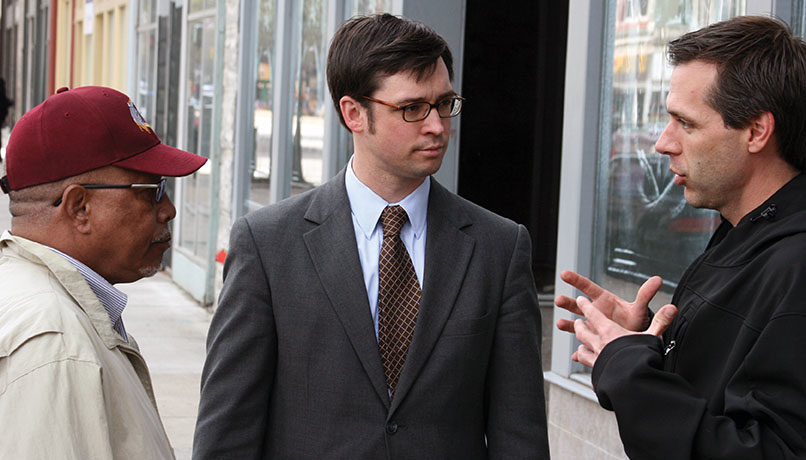For our “Move Forward” issue of Greater Richmond Grid, we asked three leaders in the region to share their thoughts on the future of business. To find out where we’re headed as a region, we turned to Angela Kelly-Wiecek, Chickahominy district representative on the Hanover Board of Supervisors; Charles R. Samuels, city council president and 2nd district representative; and Gregory H. Wingfield, CEO/president of the Greater Richmond Partnership, Inc.
Where is the region’s business community going in 2014?
Angela Kelly-Wiecek
As a region, we are doing a great job of identifying target industries and then attracting businesses in those focus areas. The Greater Richmond Partnership has identified those target industries as health and life sciences, supply chain management, advanced manufacturing, finance and insurance, professional and creative, food and beverage, data centers, and corporate headquarters. National companies like Amazon in Chesterfield and The Vitamin Shop in Ashland are great examples of companies in targeted industries that chose our region because of all that we have to offer.
The Richmond business community continues to invest heavily in our region and in the city. HDL’s expansion is a great example.
Greg Wingfield
The Partnership has very specific goals for business attraction, retention, and expansion, and moving forward, we’ll strive to meet these goals while also fundraising for our 2014-2017 cycle. As Angela mentioned, we’ve assisted several distribution centers in 2012 and 2013. Given our strategic location, companies will continue to explore Greater Richmond for their supply chain needs. The Partnership has a full schedule planned for marketing missions across the U.S. and into Europe, which has been very successful for us. With the UCI 2015 Championships on the horizon, the Partnership will be orchestrating special events to leverage this unique international draw.
This issue of Grid is about moving forward. How is the region moving forward and what does the future hold where business is concerned?
Angela Kelly-Wiecek
I believe most of our economic developers and business leaders would agree that this is an all-of-the-above strategy. We certainly want to capitalize on the active business community we have by helping them grow and expand. This will include employing the services of online web design companies like https://www.dawncreative.co.uk/ who have specialists in brand design manchester way who can increase the traffic to these online sites, and therefore raising awareness about these businesses. However, attracting new business from other areas of the country or international businesses-especially in those target sectors-is also a priority and it adds to the vitality of our region. That diversity also strengthens our long-term economic health as we are not dependent on one particular industry to drive our local economy.
Charles Samuels
The Richmond region will continue to grow. We anticipate a continued lowering of the unemployment rate (6.1 percent for 2012). In 2012 the Richmond region saw over 100 million in new investment and thousands of new jobs created. I believe we will see continued investment in our region by new and relocating businesses. These new businesses will boost other businesses in the area as well. For example, a local IT support company, perhaps like some of the it services louisville kentucky provides, will find that they have new customers as they help these businesses set up and maintain their IT networks.
Greg Wingfield
The public will continue to hear the words “jobless recovery” in the news; however, we’re seeing examples of advanced manufacturing and support center jobs return to the U.S. The quality is better under an American workforce and wages are starting to become a factor with the increase in the emerging Asian economies. We’ve assisted international companies such as BGB Technology and Aditya Birla Minacs commit to Greater Richmond because of our workforce.
How are we, as a region, creating an environment that is attractive to do business?
Angela Kelly-Wiecek
There are a number of important factors that go into making a region attractive. Certainly, each jurisdiction must have policies in place to attract new businesses, as well as help existing businesses thrive. However, as a region we need to understand how our individual decisions impact the overall climate. The dedicated level of participation among elected officials in organizations like the Greater Richmond Partnership, the Capital Region Collaborative, and other regional boards speaks highly about the positive attitude we have towards creating a vibrant business climate.
Charles Samuels
In Richmond we have eliminated the BPOL (Business, Professional and Occupational License) tax for new and relocating businesses. Our economic development director truly gets what it takes to bring business to Richmond and is working day and night to bring companies here. We have programs to help new businesses find the right location, helping existing businesses with their needs and creating a workforce development pipeline. We are investing in infrastructure to ensure companies and citizens have a positive experience in Richmond.
Greg Wingfield
Our local economic development officials have all identified areas of improvement. As an example, the Hanover Board of Supervisors approved an ordinance that will add more available acreage to be zoned for industrial usage. Real estate availability and appropriate zoning are factors that help the Partnership attract interest in site location professionals and it provides an opportunity for us to show off the region’s assets. Some of our clients’ projects are flexible, but many are not. So real estate availability can leave us off of their short list when considering an expansion.

